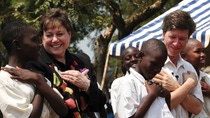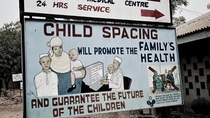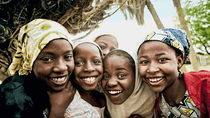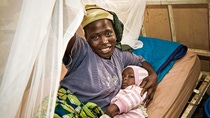Chi siamo
The great campaigner

An interview with Professor Jeffrey Sachs
Can a disease as infectious as malaria ever really be controlled – and is it worth the cost of trying? The answer, according to Professor Jeffrey Sachs, is an unequivocal “yes.”
Pioneering economist Jeffrey Sachs has campaigned long and hard to engage the global community in the fight to end poverty – of which controlling malaria is a key part. Indeed, he was among the first to bring the importance – and feasibility – of malaria control to the world’s attention. Today, the malaria community is galvanized around the U.N.’s Millennium Development Goals (MDG) to halt and begin to reverse the incidence of malaria and other major diseases by 2015. As Special Advisor to the U.N. Secretary-General on the Millennium Development Goals, Sachs understands more than most what needs to happen to make the deadline.
Creating Chemistry: The developing world is beset with problems, from disease to conflict, weak governance and extreme poverty... why is malaria so important?
Professor Jeffrey Sachs: Malaria is a major killer and barrier to economic development because not only does it cause illness and death, it impedes investment and has pervasive effects that delay or block economic growth. But it’s also an absolutely controllable disease, and one can make tremendous progress in fighting it at very low cost. So the combination of it being a major scourge and yet controllable makes it a very high priority for action.
One of the U.N.’s Millennium Development Goals is to halt and begin to reverse the incidence of malaria by 2015. Do you think this goal is still achievable?
The goal is being met right now. There’s a tremendous reversal in almost all parts of the world – most notably in sub-Saharan Africa, which is the epicenter of the global malaria burden. This progress could be even more dramatic between now and 2015 if the steps that are currently underway are strengthened and implemented as planned. Malaria stands out as one of the great success stories of the Millennium Development Goals.

Professor Jeffrey Sachs
Director of The Earth Institute, Quetelet Professor of Sustainable Development, and Professor of Health Policy and Management at Columbia University in New York.
He is also Special Advisor to United Nations Secretary-General Ban Ki-moon. From 2002 to 2006, he was Director of the United Nations Millennium Project, and Special Advisor to United Nations Secretary-General Kofi Annan on the Millennium Development Goals, the internationally agreed goals to reduce extreme poverty, disease, and hunger by the year 2015.
Why has it been so successful?
Malaria is subject to rigorous control through a set of known and established protocols. Malaria control has two major dimensions: One is Vector control to block transmission, and the other is case management to treat cases of the disease. These are interacting because better treatment is also a kind of transmission control.
There’s been a suite of very important technologies not only developed but implemented in the last 15 or so years: a new class of medicines based on artemisinin; new Rapid Diagnostic Tests which have removed the need for microscopy; much better vector control capability because of long-lasting insecticide-treated nets (LLINs); and better systems for community-based treatment. When you put all that together you have the potential for very significant control.
The other two things that have changed over the last 10 years are increased financing to implement these measures, and improved systems from the global to the local level. This has been a very, very major effort – and a fight also, to gain attention, to mobilize resources and build systems – but it’s bearing fruit.
So do you think working towards that goal is a matter of simply reinforcing what’s in place now?
There’s always a need for continuing innovation, especially since malaria medicines and vector control technologies can lose their efficacy through resistance – either of the mosquito to insecticides, or the parasites to medicine. What we know right now is that this very powerful combination of action requires a whole system of delivery. That means resources: natural resources, human resources, organizational capacity, political will. And keeping such systems in motion is not simple.
This is not a market-driven process by and large. It’s a public policy-driven process – which makes it harder than if this were a matter of selling products on an open market.
A tremendous amount of energy, leadership and intellectual effort needs to go into sustaining a high-intensity control effort. So far there has been a lot of progress – and it has required breaking through a lot of barriers of ignorance and indifference. In many parts of the world high income countries are needed to support much of this, and that has happened. Now we face another challenge: Rich countries are all in economic and political crisis right now. Whether they are able to sustain this effort is probably the most important question.
“Malaria stands out as one of the great success stories of the Millenium Development Goals.”
Professor Jeffrey Sachs
Do you think political will is waning?
Certainly in Europe, the United States and Japan, aid budgets are under attack – even though the total cost of malaria control that is needed at $3 billion to $4 billion a year is tiny. Mobilizing that level of funding is very difficult because malaria gets swept up in the general frenzy to cut development aid that is occurring in U.S. Congress and elsewhere. So this is a very difficult period. And I would say that in Europe, the will to keep up this fight is limited and fragile. So we’ve had great success, but I don’t think we can guarantee against backsliding.
So how do you maintain momentum and keep donors engaged and committed?
Well, it requires a tremendous amount of legwork. In the early years I was heavily involved in campaigning: Helping to set up the Global Fund, the President’s Malaria Initiative in the United States, campaigning for the mass distribution of bed nets and many other components. And I can tell you – you face a lot of blank stares from senior officials for many, many years. So it requires people who are ready to spend a tremendous amount of time trying to educate, control, shame, pressure and advise people. We need as many champions of that sort who can speak loudly, clearly, boldly and ethically about this – I think this is key. Success requires a tremendous sustained effort by lots of stakeholders.
What role does private enterprise have to play?
Companies have a major role to play in providing quality products and improving technologies. And I would say [their role is also] critically – and unusually in some ways – working with public sector organizations, or multilateral organizations like the Global Fund, or working with the U.N. Secretary-General, to ensure that the public-private partnerships needed for success are operating effectively. So I think companies have multiple roles – both as developers and providers of technology, as capable scale managers, and as partners in public-private partnerships. And CEOs need to appreciate that they are among society’s most important political actors, because politicians listen to them. They have to explain to politicians who are overwhelmed, overstretched, and not necessarily aware of the great progress that has been made, that this fight against malaria needs to be sustained and scaled up.

For years you’ve argued the case for an integrated approach to tackling poverty – through fighting disease, increasing agricultural productivity and so on. The Millennium Villages project put the theory into practice in 33 villages – with positive results. Could you tell us a bit about that?
This project is now in about 15 countries. Leading scientists work together with local communities to apply best practice technology to achieve the Millennium Development Goals. Malaria control is one of the priorities. We use a community-based malaria control methodology: mass distribution of LLINs, community health workers to help households use the nets properly, and a community health workers’ system which covers all households to observe cases of malaria in the community and then apply treatment within the community – saving the time required to travel to clinics and thereby saving many lives.
Community health workers carry mobile phones with an expert, text message-based system to enter the results of Rapid Diagnostic Tests for individual patients, and then receive instructions by text on dosage and follow-up advice for the households. So this is the holistic system of community-based malaria control including vector control and case management. It is cutting edge, and the results are striking: a very significant reduction of malaria incidence, mortality rates in children under five, and overall disease burden from malaria across sites. The project has built systems for highly successful, on-the-ground malaria control.
“Malaria is an absolutely controllable disease, and one can make tremendous progress in fighting it at very low cost.”
Professor Jeffrey Sachs
What would you say to the criticism that the results of the Millennium Villages can’t be replicated everywhere?
It’s the opposite. In Nigeria, the Millennium Village project is being taken from two main sites to 113 local government areas; so from a coverage of about 50,000 people to about 20 million people. We just signed an agreement with the government of Rwanda to scale up the lessons of the Rwandan villages to a national scale. Similarly, we’ll proceed in Senegal with the same type of scale-up. So the use of systems – especially information and communications technology (ICT) systems that are readily replicable and that can be documented and rigorously costed – is why this project is so important.
We’ve also issued a world report on optimum deployment of community health workers and we’ve estimated the cost of such deployment to be roughly $5 to $6 per villager in a rural area. We’re working with governments to scale up community-based health workers as a frontline tool in the control of disease. Not just for malaria, but also with other problems such as chronic hunger and safety in childbirth.
So the whole project is designed for scale-up by using open source ICT and using vigorous costing and system development.

Why is such an integrated approach so important?
Significant gains have been achieved by the mass distribution of LLINs – something for which I campaigned for over a decade. But I’ve also stressed that vector control needs to be combined with effective case management. And in the African context, effective case management can’t be done as a clinic-based service – [clinics] are often too far away, transport is weak, there are too few higher-level health workers such as registered nurses or clinical operatives – so we need community-based treatment. But this requires a system: training of health workers, logistics, staffing, supervision, monitoring, data management. So you can’t do these things haphazardly or with the magic bullet of something as wonderful as the LLINs.
A lot of the public discourse is about the magic of the single tool, and of course it’s good for the public to understand some of the key inputs. But it worries me a lot because [while] the big success of the last couple of years has been the mass distribution of bed nets – and there is more availability of artemisinin-based combination therapies – there hasn’t yet been a proper scaling up of primary health systems. This is what the Global Fund should invest in, but it is under financial attack by donor governments in the West, basically because of the spillover of the budget crisis. And I think this is the weakest point of the malaria campaign right now. The 2015 campaign will not work unless we massively scale up the training and supervising of health workers.
Isn’t government corruption still also a major challenge?
I regard this to a very large extent as an information challenge as much as a morality challenge, in that the mismanagement and misuse of money is a phenomenon everywhere in the world. There has to be very strong diligence. We have to use ICT to make sure inputs go where they’re supposed to go and to make sure we’re tracking outputs and outcomes so that we know how these projects are doing and can make adjustments as necessary.
What would you like to see happen next?
The single most important thing right now is that the Global Fund for financing malaria control should remain robust to 2015 and should support the scaling-up of primary health systems globally – especially community-based malaria control strategies around community health workers. If this is done – if the Global Fund is properly financed, and if countries are able to obtain funding from it for effective community-based malaria control, we will succeed.




